Piłsudski, Dmowski, Paderewski? Let us finally stop pretending that only they fought for Poland. Had it not been for women, the Second Republic of Poland would not have come into existence. Below 10 Polish women whose merits cannot be overestimated.
Maria Dulębianka
A feminist and writer who showed before the outbreak of the World War that a woman can do anything. In 1908 - to the scandal of men - ran for deputy to the Galician National Seym, winning half a thousand votes .
In August 1914, she helped recruit new members of the legionary movement. When the Russians captured Lviv, instead of fleeing, she engaged in comprehensive assistance to the inhabitants of the occupied city. After the disgraceful Brest Treaty - when the Germans tried to tear off part of the Polish lands and hand them over to the Ukrainians - she developed an impressive protest action.
Hanna Kudelska
The news of the outbreak of the war surprised everyone. The riflemen were about to leave Krakow Oleandry to fight, and the most necessary things were missing:food, weapons, money, even clothes. Hanna Kudelska was among the women who immediately rolled up their sleeves and created the commissariat of the nascent Polish army from scratch. She accepted volunteers, trained them, and then sent them to sew uniforms, nurse the sick, make vaccinations, collect money among the inhabitants of Krakow ...
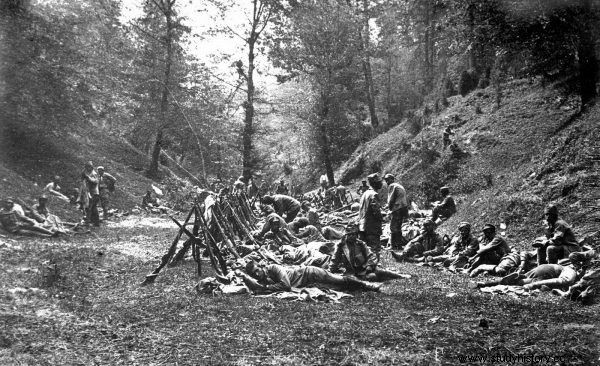
Hanna Kudelska created from scratch created a legionary commissariat. The photo shows the soldiers of the First Cadre Company in August 1914.
Later, on the combat route, she organized field kitchens, employing a whole "staff of workers" and feeding five hundred peasants a day. In the following years, when the Germans destroyed the legions and imprisoned disobedient soldiers in internment camps, she supported the imprisoned by "carrying sacks of bread and linen under the barbed wire and prison gates."
Maria Jaxa-Kwiatkowska
Inconvenient heroine of the underworld. According to legend, the Polish Military Organization operating behind enemy lines was established by order of Józef Piłsudski. In reality, however, the POW was established before the Commander could issue any instructions. Kwiatkowska was one of the founders of the organization. And it was she who immediately headed the Women's Division.
Girls under her control organized the entire bloodstream of the conspiracy:they manufactured passports, collected funds, distributed illegal prints, installed bombs, stored weapons ... Sometimes they only complained that it was easier before the war broke out, because then it was time to smuggle handy pistols, not military rifles. "When we were carrying such art, we had to mask it well, because he could not take the shape of a roller shutter roller at any time" - joked one of Kwiatowska's subordinates.
Janina Prystorowa
A few years before the outbreak of World War I, she took part in one of the most spectacular actions of the independence underground. She prepared and supported the robbery at the Bezdany railway station, when the militia of the Polish Socialist Party stopped the tsarist train, broke through the door of the mail car and collected a huge sum of three hundred thousand rubles. It is commonly said that it was an "action of the four prime ministers". Wrong. Four involvement in the actions of a woman also played an enormous role - including the future MP and Prime Minister Janina Prystorowa.
Thanks to her and other independence fighters, the people gained the money needed to create the Union of Active Combat, and then - the Rifle Associations, without which there would be no Legions.
Barbara Kossuthówna
One of the first women who, despite men's dislike and contempt, joined the rifle movement and even won the right to participate in military maneuvers. She was ready to endure more than one humiliation, as long as she put on a military uniform. In the spring of 1914, she took part in the first weapons-in-hand exercises, for which Piłsudski allowed not only shooters, but also shooters. Years later, she remembered with regret that instead of practicing shooting, she was then ... sent to the pots, supposedly in order to adapt to the role of a provision sergeant.
"We had to scrub [the dishes] with bunches of grass, sand, until the nails were peeled off and the blood on our fingers was bled," she said. This, however, did not dampen her eagerness. After the outbreak of the war, she was assigned to a hospital in Jabłonków as a nurse. She was stuck at the patient's beds for thirty-six hours non-stop, slept no more than four nights a week, and contracted typhus in the hospital. However, she has helped countless patients, often saving them from death.
Aleksandra Szczerbińska
Remembered mainly as a life companion, and then wife of Józef Piłsudski. Wrong, because she had enormous, unquestionable and completely independent contributions to the independence movement.
After the daring action at Bezdanami, she took away and threw most of the loot across the border, while the men carelessly waited for her in safe Galicia. And when the war broke out, she was appointed commander of women's intelligence.
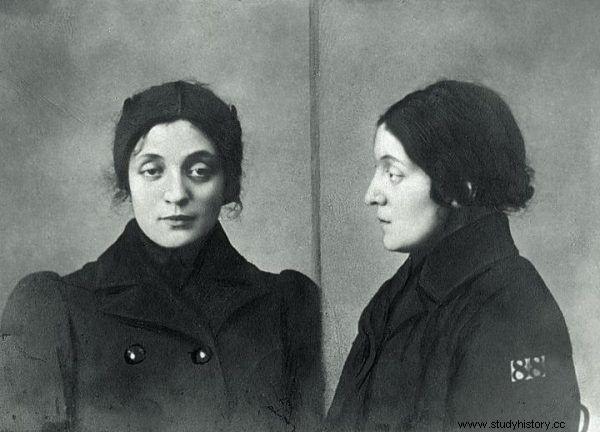
Aleksandra Szczerbińska sacrificed a lot for Polish independence. The illustration shows a photo taken by Tsarist Ochrana after her arrest in 1907,
Piłsudski himself admitted that the branch headed by Szczerbińska was one of his greatest strengths. Thanks to the intelligence officers, the Commander knew the enemy's moves and the location of his forces. The clandestine soldiers also allowed him to establish contact with the towns on the other side of the front.
Colleagues remembered her as a reliable fighter, distinguished by cold blood and fortitude. Her subordinates had unwavering respect for her. The care with which Aleksandra took care of the quarters for the soldiers and the firmness with which she fought not to overwork themselves and not to take unnecessary risks were remembered.
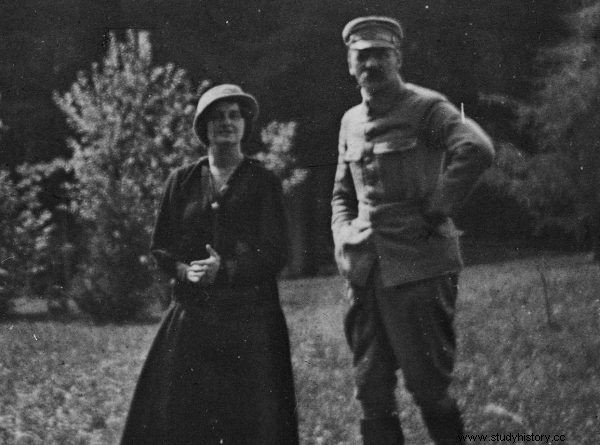
Szczerbińska was arrested by the Germans for her independence activities in the Polish Military Organization and ended up in the camp in Szczypiorno. In the photo, together with Józef Piłsudski during his stay in Zakopane. 1916.
She sat at night deciphering the letters delivered, and performed a whole series of thankless, administrative functions. One of the soldiers emphasized that it was the boss who was "the hardest" of all the intelligence services. She worked almost tirelessly, and had to be on duty far away from the enemy, front and all action.
The latter, however, was not lacking at all:when the intelligence unit was liquidated, Aleksandra became involved in the work of the POW. And it was for her that she was arrested and sent to the camp in Szczypiorno, where the Germans kept her in conditions that were offensive to all dignity.
Zofia Moraczewska
The leader of the largest women's organization supporting the struggle for independence:the Women's League of Galicia and Silesia. She even had thirteen thousand activists under her.
Lips, as they were called, assisted the legionnaires in hundreds of touching ways. They organized Christmas for soldiers and Easter breakfasts, and sent letters to members of the troops that cheered up and encouraged them to fight. And also packages with footballs, writing utensils, cameras (hence all the photos of legionnaires!) Or even with… musical instruments for regimental orchestras. They also organized mourning ceremonies and made small gifts for soldiers on their own.
The league led by Moraczewska raised enormous funds for the legions, often resorting to exceptionally clever methods. Official stores were established in Krakow and Lviv, selling patriotic newspapers, books or even badges, manufactured by cupcakes. Market stalls were erected in smaller towns. In Kałusz, women ran a buffet at the station. Ingeniously? It is nothing compared to the activity of the ladies from Uncle. Those for money "made artificial flowers and Easter eggs and maintained an exemplary vegetable culture."
Thanks to Ligia, nurseries for orphans of legionnaires were created, as well as inns for soldiers, clubhouses and tea rooms. And in order to raise the level of the cultural boys of Piłsudski, the ladies sent them to the front ... 20,000 books!
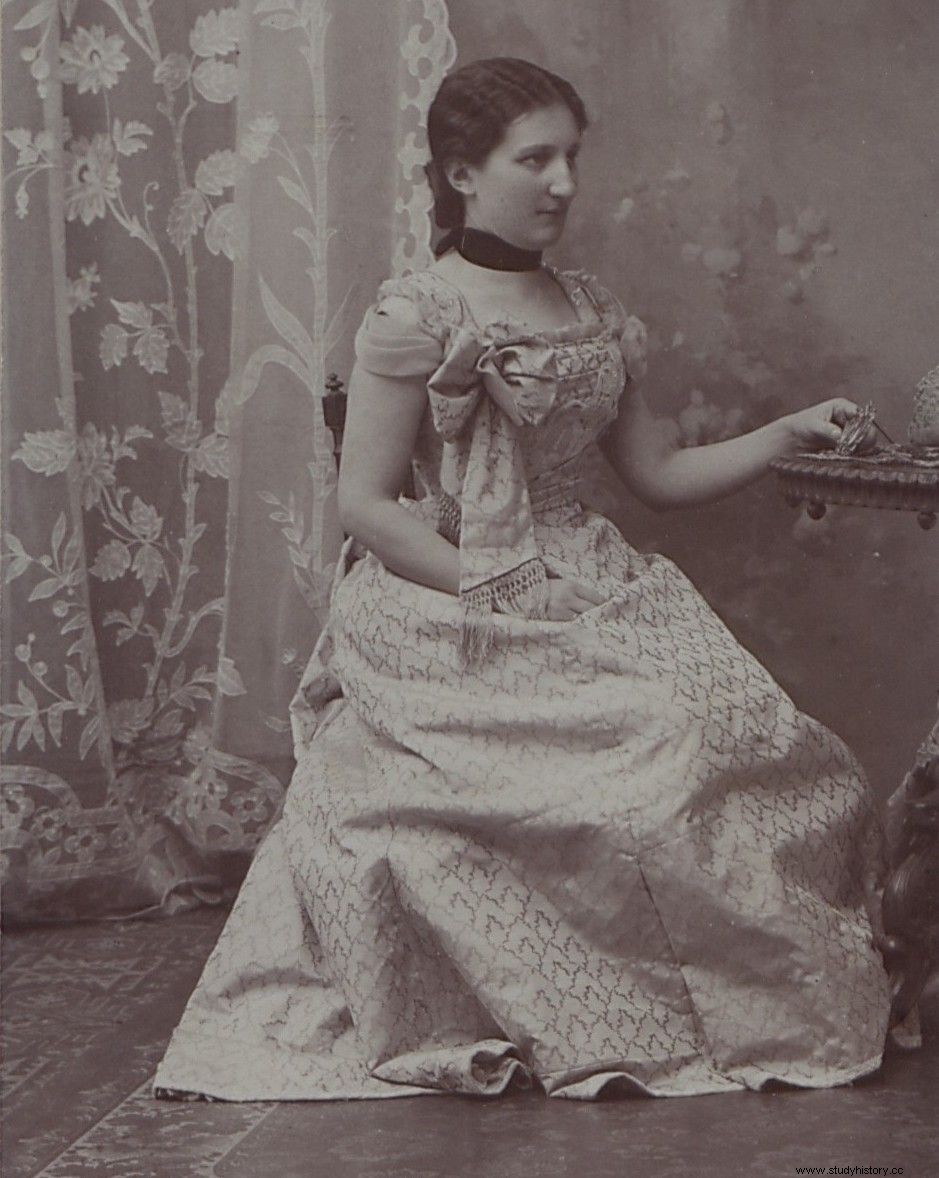
Led by Zofia Moraczewska (pictured), the Women's League of Galicia and Silesia collected huge sums, which were later used to help the legionnaires and their families,
After the war, Moraczewska herself briefly became the prime minister. Then - a deputy from the Polish Socialist Party.
Maria Korśmieowiczówna
One of the smartest and most effective interviewers in the unit led by Aleksandra Szczerbińska. Her exploits would be enough to make a whole series of sensational films.
Once, Maria - carrying an urgent report - was faced with the necessity of crossing a vast lake. Instead of asking the peasants for help and risking being exposed, she decided to use not just one Russian soldier, but their entire unit. She charmed the privates stationed nearby and persuaded them to ... get a boat for her themselves and bring her to the marina. In return, she promised an innocent but romantic ride on the lake. She kept her word, then stole a boat at night and swam to the opposite bank.
She had a different way of dealing with the officers. She mastered their pity. For example, she was able to convince the general adjutant that her friend's family was stuck on the German side of the front and required urgent help ... The man not only believed in the bleak story and stamped the documents, but even assigned the agent an escort. Nay! He ordered one of his men to carry suitcases for Maria.
After the liquidation of the branch, she was transferred to the POW. In the last days of the war, she organized a women's unit in Krakow, preparing it for the expected fight for the city against the Austrians.
Maria Rychterówna
A shooter, a soldier of the Intelligence Department, a member of the Polish Military Organization ... and above all a woman thanks to whom thousands of Poles could encounter the first announcement of the future organs of the Polish state. In 1915, when the Germans occupied most of the Polish lands and introduced the extremely restrictive censorship of Rychterówna - together with a group of friends, but without the consent, and even against the commanders from the POW - independently created ... Polish post office intended for ordinary citizens.
We were able to quickly collect a number of postman bags, set up a receiving station in the capital and a network of stage points in the most important cities. In Piotrków, in Radom, Łomża, Kraków… The activity was gaining momentum. The men foretold a quick inflow that would harm the entire underground. Meanwhile, the post office worked efficiently and ... profitably. Because the postman bags for each delivered parcel were from twenty to thirty kopecks. The money was then loyally transferred to the POW cash desk.
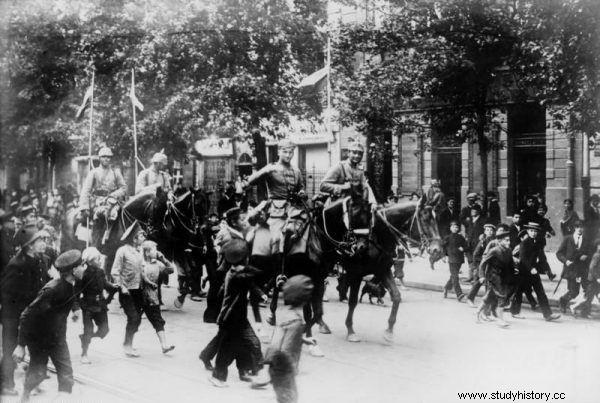
After the Germans took over most of the Polish lands in 1915 and introduced severe censorship, Maria Rychterówna decided to do something about it and achieved a spectacular success. In the photo, the Germans enter Warsaw.
In Warsaw alone, about twenty women were involved in the work of the Private Letters Post Office. Not only was the courier network not broken, but it operated as long as the German restrictions lasted. In total, she delivered about four thousand letters. And for many Poles it was the nucleus of Poczta Polska, and even the entire Polish administration.
Stefania Flekówna
One of the reliable propagandists of the independence movement. When the occupation censorship was still working at its best, and the legionnaires' merits were not even allowed to be whispered, she became the head of the administration of the largest underground patriotic magazine.
“The Government and the Army” was printed in as many as ten thousand copies, explaining Piłsudski's line, shedding real light on the course of the war and exposing the actions of the German authorities. "We have never done similar work in our lives and we had no idea about it," Stefka wrote honestly. And much too modestly, because the entire capital city started reading quickly with the newspaper created by a group of amateurs.
And it did not end with the newspapers at all. Brochures devoted to history, political manifestos, even guides on how to deal with the occupant were published ... Hundreds of thousands of Poles learned from prints prepared by women, smuggled and distributed by them. And if so many of our great-grandparents believed that independence was close, it was thanks to women such as Stefania Flekówna.
This is just the beginning…
There were thousands of women of merit for the cause of independence. Learn about the fate of the greatest heroines, the most determined warriors and the most deserving conspirators. Independence is not only a man's business! More in Kamil Janicki's book:" Niepokorne damy. Women who won an independent Poland ”.
